3 may 2020
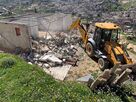
Israeli occupation forces ordered today a halt on the construction of residential structures and their subsequent demolition.
The structures, which include two homes, are owned by residents of the village of Qarawat Bani Hassan, to the west of the occupied West Bank city of Salfit, according to local sources.
The occupation authorities handed two Palestinians an order to stop construction of their two houses and demolish them, while a third resident was handed a demolition order for his residential shack.
Meanwhile, Israeli soldiers chased farmers and shepherds while working near the village, claiming that they were close to the neighboring illegal Israeli settlements.
The village is located in the so-called Area C of the occupied West Bank, under complete Israeli control. Israel almost prohibits all kinds of urban and agricultural development for Palestinians in the area for the benefit of its settlement enterprise.
The structures, which include two homes, are owned by residents of the village of Qarawat Bani Hassan, to the west of the occupied West Bank city of Salfit, according to local sources.
The occupation authorities handed two Palestinians an order to stop construction of their two houses and demolish them, while a third resident was handed a demolition order for his residential shack.
Meanwhile, Israeli soldiers chased farmers and shepherds while working near the village, claiming that they were close to the neighboring illegal Israeli settlements.
The village is located in the so-called Area C of the occupied West Bank, under complete Israeli control. Israel almost prohibits all kinds of urban and agricultural development for Palestinians in the area for the benefit of its settlement enterprise.
6 apr 2020
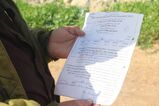
Israeli forces today ordered a halt on the construction of several structures in Khirbet Yarza and al-Jiftlik villages in the Jordan Valley, according to sources.
Aref Daraghmeh, an activist, told WAFA that Israeli forces handed out a villager from Khirbet Yarza, east of Tubas city, a notice ordering him to stop the construction of some agricultural and residential structures as well as tents. The villager was identified as Salem Abu al-Tayyib.
Soldiers also handed notices to several other villagers from al-Jiftlik, north of Jericho city, ordering them to halt the construction of agricultural and residential tents and uproot palm trees.
They cited unlicensed construction as a pretext for halting construction.
The Jordan Valley, which is a fertile strip of land running west along the Jordan River, is home to about 65,000 Palestinians and makes up approximately 30% of the West Bank.
Since 1967, when the Israeli army occupied the West Bank, Israel has transferred at least 11,000 of its Jewish citizens to the Jordan Valley. Some of the settlements in which they live were built almost entirely on private Palestinian land.
The Israel military has also designated about 46 percent of the Jordan Valley as a closed military zone since the beginning of the occupation in June 1967, and has been utilizing the pretext of military drills to forcefully displace Palestinian families living there as part of a policy of ethnic cleansing and stifling Palestinian development in the area.
Approximately 6,200 Palestinians live in 38 communities in places earmarked for military use and have had to obtain permission from the Israeli authorities to enter and live in their communities.
In violation of international law, the Israeli military not only temporarily displaces the communities on a regular basis, but also confiscates their farmlands, demolishes their homes and infrastructure from time to time.
Besides undergoing temporary displacement, the Palestinian families living there face a myriad restrictions on access to resources and services.
Meanwhile, Israel exploits the resources of the area and generates profit by allocating generous tracts of land and water resources for the benefit of settlers.
Israeli politicians have made it clear on several occasions that the highly strategic Jordan Valley would remain under their control in any eventuality.
Aref Daraghmeh, an activist, told WAFA that Israeli forces handed out a villager from Khirbet Yarza, east of Tubas city, a notice ordering him to stop the construction of some agricultural and residential structures as well as tents. The villager was identified as Salem Abu al-Tayyib.
Soldiers also handed notices to several other villagers from al-Jiftlik, north of Jericho city, ordering them to halt the construction of agricultural and residential tents and uproot palm trees.
They cited unlicensed construction as a pretext for halting construction.
The Jordan Valley, which is a fertile strip of land running west along the Jordan River, is home to about 65,000 Palestinians and makes up approximately 30% of the West Bank.
Since 1967, when the Israeli army occupied the West Bank, Israel has transferred at least 11,000 of its Jewish citizens to the Jordan Valley. Some of the settlements in which they live were built almost entirely on private Palestinian land.
The Israel military has also designated about 46 percent of the Jordan Valley as a closed military zone since the beginning of the occupation in June 1967, and has been utilizing the pretext of military drills to forcefully displace Palestinian families living there as part of a policy of ethnic cleansing and stifling Palestinian development in the area.
Approximately 6,200 Palestinians live in 38 communities in places earmarked for military use and have had to obtain permission from the Israeli authorities to enter and live in their communities.
In violation of international law, the Israeli military not only temporarily displaces the communities on a regular basis, but also confiscates their farmlands, demolishes their homes and infrastructure from time to time.
Besides undergoing temporary displacement, the Palestinian families living there face a myriad restrictions on access to resources and services.
Meanwhile, Israel exploits the resources of the area and generates profit by allocating generous tracts of land and water resources for the benefit of settlers.
Israeli politicians have made it clear on several occasions that the highly strategic Jordan Valley would remain under their control in any eventuality.
26 mar 2020
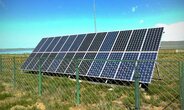
Israeli forces today demolished a residential structure and seized tents and other equipment in the Jordan Valley village of Ibziq, north of the occupied West Bank city of Tubas, according to a local official.
Abdul Majeed Khdeirat, head of Ibziq village council, said Israeli forces raided the village and destroyed a 70-square-meter shack and two water and electricity pumps.
He added that the forces also seized eight tents that were not set up yet, solar panels, six spraying equipment, and building blocks for use by the village's mosque, clinic and council, under the pretext that the construction was taking place in a military zone.
Abdul Majeed Khdeirat, head of Ibziq village council, said Israeli forces raided the village and destroyed a 70-square-meter shack and two water and electricity pumps.
He added that the forces also seized eight tents that were not set up yet, solar panels, six spraying equipment, and building blocks for use by the village's mosque, clinic and council, under the pretext that the construction was taking place in a military zone.
9 mar 2020

A total of 2,654 building licenses were issued in the fourth quarter of 2019 in Palestine, an increase by 20% compared with the third quarter of 2019 and an increase by 2% compared with the fourth quarter of 2018, today said the Palestinian Central Bureau of Statistics (PCBS).
Of the total number of new building licenses issued in the fourth quarter, 2,007 were for new ones, an increase by 38% compared with the third quarter of 2019 and by 28% compared with the fourth quarter of 2018.
The number of new dwellings in the fourth quarter of 2019 increased by 45% compared with the third quarter of 2019 and increased by 11% compared with the fourth quarter of 2018.
Of the total number of new building licenses issued in the fourth quarter, 2,007 were for new ones, an increase by 38% compared with the third quarter of 2019 and by 28% compared with the fourth quarter of 2018.
The number of new dwellings in the fourth quarter of 2019 increased by 45% compared with the third quarter of 2019 and increased by 11% compared with the fourth quarter of 2018.
5 mar 2020
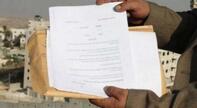
Israeli authorities today ordered a halt on construction of agricultural structures in the village of Azzun Atma, to the south of the northern occupied West Bank city of Qalqilya, and a retaining wall in a village near Ramallah, local sources said. video
The sources said that Israeli forces notified Farouq Quzmar of the order to stop building the structures, claiming they were being built without a permit.
Sources also said that the Israeli army destroyed a retaining wall for a farm in the village of Nilin, west of Ramallah. video
During the demolition of the wall, residents confronted the soldiers who assaulted and one youth and injured him, said the sources.
The sources said that Israeli forces notified Farouq Quzmar of the order to stop building the structures, claiming they were being built without a permit.
Sources also said that the Israeli army destroyed a retaining wall for a farm in the village of Nilin, west of Ramallah. video
During the demolition of the wall, residents confronted the soldiers who assaulted and one youth and injured him, said the sources.
11 feb 2020
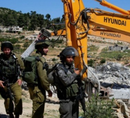
Israeli authorities today issued a halt on construction orders against four structures in the area of Hamsa al-Tahta, in the northern Jordan Valley, according to local sources.
Aref Daraghmeh, an activist, told WAFA that the order includes a halt on construction of three residential structures and an animal barn.
Aref Daraghmeh, an activist, told WAFA that the order includes a halt on construction of three residential structures and an animal barn.
6 feb 2020
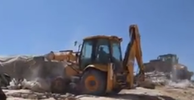
The Israel occupation authorities, on Wednesday, ordered a halt to the rehabilitation of a school playground in the village of Susiya, southern occupied West Bank, as well as demolition orders for a structure in Sebastia village, northern West Bank.
Abdul Aziz Abu Finnar, from the Yatta municipality, said Israeli forces handed Susiya School principal a notice ordering him to stop work on the rehabilitation of the school’s playground, the Palestinian News and Info Agency (WAFA) reported.
The mayor of Sebastia, Mohammad Azim, stated that the Israeli army notified a Palestinian resident, Nael Abu Aqel, of Sebastia of its intention to demolish his structure, and ordered Malik Makhalfeh to remove his tent from the archaeological area of the village.
Abdul Aziz Abu Finnar, from the Yatta municipality, said Israeli forces handed Susiya School principal a notice ordering him to stop work on the rehabilitation of the school’s playground, the Palestinian News and Info Agency (WAFA) reported.
The mayor of Sebastia, Mohammad Azim, stated that the Israeli army notified a Palestinian resident, Nael Abu Aqel, of Sebastia of its intention to demolish his structure, and ordered Malik Makhalfeh to remove his tent from the archaeological area of the village.

On February 2, 2020, Israeli Occupation Forces (IOF) announced tightening restrictions on the movement of goods into the Gaza Strip and on the movement of merchants/businesspersons in response to incendiary balloons and projectiles fired towards Israeli communities near the Gaza Strip.
In a press release, Coordinator of Government Activities in the Territories, Maj. Gen. Kamil Abu Rokon, announced freezing facilitations relevant to commerce, economy and movement across checkpoints, including decreasing the number of businesspersons permits and ceasing import of cement to the Gaza Strip.
The Coordinator proclaimed that these measures are in response to violence against Israel in its border area with the Gaza Strip and launching projectiles towards Israel.
According to PCHR follow-up, Israeli authorities informed the Presidential Committee for Goods Coordination in Gaza that its decision to ban the entry of cement into the Gaza Strip is effective as of February 1, 2020. Simultaneously, IOF annulled 460 exit permits previously issued for businesspersons from the Gaza Strip.
It should be noted that this decision followed Israeli authorities’ decision 3 days earlier to allow entry of the type of cement used for tiling through Kerm Shalom crossing in a departure from the Gaza Reconstruction Mechanism (GRM) managed by the United Nations. While entry of cement used to make concrete was sustained through GRM.
This decision falls under the Israeli closure policy imposed on the Gaza Strip since June 2007, as tight restrictions are imposed on the movement of persons and goods ever since. In terms of commercial crossing, Israeli authorities have 62 items listed on the “dual-use” items, these items include basic materials and commodities.
Furthermore, Israeli authorities continue to ban Gaza exports except for a marginal amount that does not exceed 5.7% of the Gaza monthly exports prior to June 2007.
As to crossings dedicated for the movement of individuals, IOF continue to impose extreme restrictions on the freedom of movement of the Gaza population through Beit Hanoun “Erez” Crossing and only allows a limited number of categories with great limitations.
These newly adopted measures by Israel will deepen the humanitarian and living crises of the Gaza Strip, especially under the skyrocketing unemployment, poverty and food insecurity.
The Gaza unemployment has reached 45%, a total of 217,100 thousand workers unemployed, while more than 50% are under the poverty line according to the Palestinian Central Bureau of Statistics poverty in the Gaza Strip is 53%, and more than 67% of the Gaza population suffer from food insecurity according to the United Nations Office for the Coordination of Humanitarian Affairs (OCHA).
The Palestinian Centre for Human Rights is greatly concerned about IOF’s decision to tighten the Gaza closure for its grave consequences on the economic and living conditions of the Gaza Strip population.
PCHR believes that this decision is a form of collective punishment and retaliatory action committed by IOF against Palestinian civilians.
In light of the above, PCHR calls upon the international community to act:
In a press release, Coordinator of Government Activities in the Territories, Maj. Gen. Kamil Abu Rokon, announced freezing facilitations relevant to commerce, economy and movement across checkpoints, including decreasing the number of businesspersons permits and ceasing import of cement to the Gaza Strip.
The Coordinator proclaimed that these measures are in response to violence against Israel in its border area with the Gaza Strip and launching projectiles towards Israel.
According to PCHR follow-up, Israeli authorities informed the Presidential Committee for Goods Coordination in Gaza that its decision to ban the entry of cement into the Gaza Strip is effective as of February 1, 2020. Simultaneously, IOF annulled 460 exit permits previously issued for businesspersons from the Gaza Strip.
It should be noted that this decision followed Israeli authorities’ decision 3 days earlier to allow entry of the type of cement used for tiling through Kerm Shalom crossing in a departure from the Gaza Reconstruction Mechanism (GRM) managed by the United Nations. While entry of cement used to make concrete was sustained through GRM.
This decision falls under the Israeli closure policy imposed on the Gaza Strip since June 2007, as tight restrictions are imposed on the movement of persons and goods ever since. In terms of commercial crossing, Israeli authorities have 62 items listed on the “dual-use” items, these items include basic materials and commodities.
Furthermore, Israeli authorities continue to ban Gaza exports except for a marginal amount that does not exceed 5.7% of the Gaza monthly exports prior to June 2007.
As to crossings dedicated for the movement of individuals, IOF continue to impose extreme restrictions on the freedom of movement of the Gaza population through Beit Hanoun “Erez” Crossing and only allows a limited number of categories with great limitations.
These newly adopted measures by Israel will deepen the humanitarian and living crises of the Gaza Strip, especially under the skyrocketing unemployment, poverty and food insecurity.
The Gaza unemployment has reached 45%, a total of 217,100 thousand workers unemployed, while more than 50% are under the poverty line according to the Palestinian Central Bureau of Statistics poverty in the Gaza Strip is 53%, and more than 67% of the Gaza population suffer from food insecurity according to the United Nations Office for the Coordination of Humanitarian Affairs (OCHA).
The Palestinian Centre for Human Rights is greatly concerned about IOF’s decision to tighten the Gaza closure for its grave consequences on the economic and living conditions of the Gaza Strip population.
PCHR believes that this decision is a form of collective punishment and retaliatory action committed by IOF against Palestinian civilians.
In light of the above, PCHR calls upon the international community to act:
